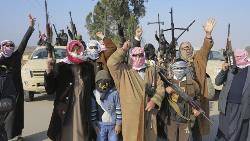The fight to control Iraq's biggest province, Anbar, has intensified, with air attacks by the military killing dozens of people and the army preparing for an assault on a second city controlled by fighters.
Missile strikes on Ramadi, capital of the western province, killed 25 people on Tuesday, according to an Iraqi Defense Ministry spokesman, while Fallujah remained deserted as residents fled the violence and the army prepared to launch an operation to regain control of it.
Military reinforcements are preparing for a full-on offensive, with the help of some of the local tribal fighters.
Early on Tuesday, three loud explosions were heard outside Fallujah, a witness said, while the army deployed reinforcements.
Soldiers are being kept on standby while the government waits to see if the tribes allow the army to enter Fallujah.
Nouri al-Maliki, the Iraqi prime minister, has called on residents to expel ISIL fighters and stave off a military offensive.
However, Sheikh Ali al-Hammad, a senior tribal leader, told AFP on Monday that ISIL fighters had left Fallujah, and that it was now in the hands of tribesmen.
Attacking Fallujah, a Sunni-majority city, would be extremely politically sensitive, as it could further inflame tensions between members of Iraq's Sunni Arabs and the Shia-led government.
The immediate cause of the unrest in Anbar was the December 28 arrest of a Sunni politician, followed by the government's dismantling of an anti-government Sunni protest camp in Ramadi.
Open control
Parts of Ramadi and all of Fallujah were seized by fighters last week - the first time they have exercised such open control in major cities since the height of the Sunni resistance that followed the 2003 US-led invasion.
Overnight, security forces and allied tribesmen sought to retake south Ramadi from fighters loyal to ISIL, but the assault failed.
Four civilians were killed and 14 wounded in the fighting, according to Ramadi Hospital's Dr Ahmed Abdul Salam, who had no casualty figures for security forces or the fighters.
Elsewhere in Iraq, a suicide bomber drove a lorry filled with explosives into a police station in the northern city of Kirkuk.
At least two people died in the attack and several others were injured.
PHOTO CAPTION
Tribal fighters gesture after deploying themselves on the streets of Ramadi, January 6, 2014.
Al-Jazeera


 Home
Home Discover Islam
Discover Islam Quran Recitations
Quran Recitations Lectures
Lectures
 Fatwa
Fatwa Articles
Articles Fiqh
Fiqh E-Books
E-Books Boys & Girls
Boys & Girls  Hajj Rulings
Hajj Rulings Hajj Fatwas
Hajj Fatwas














